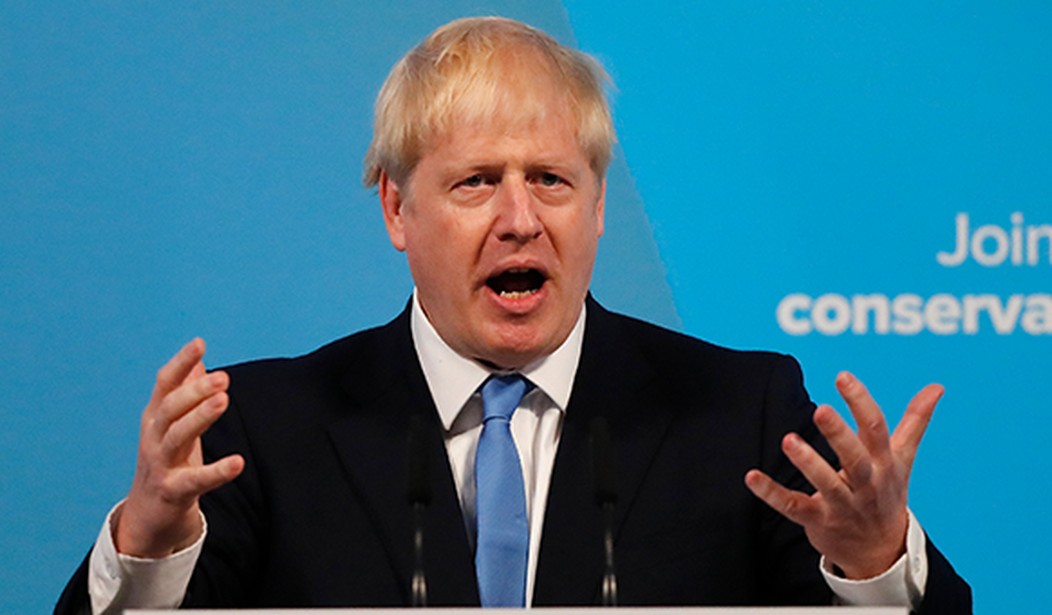Recent polls indicate that the Conservative Party is enjoying a revival in the wake of Boris Johnson's elevation to the role of Prime Minister. While many Britons hate Johnson with a passion — evoking comparisons to Trump Derangement Syndrome — Brexit supporters are reassured by his commitment to taking the U.K. out of the EU by the October 31st deadline. Support for the Brexit Party has, therefore, declined as Brexit backers come “home” to the Conservatives.
This helps Johnson and strengthens his position in negotiations with MPs and EU officials, but no one should underestimate the gravity and immensity of his task. Parliament has stubbornly refused to approve Theresa May's Brexit agreement, and it strongly opposes a no-deal Brexit. In other words, the only two paths towards Brexit that we know of appear to be blocked.
Johnson, moreover, has no choice but to go for broke on Brexit, because he has staked his premiership on his ability to deliver it. And, if MPs sense that he is preparing to go around them to achieve Brexit, they are likely to bring his government down in a flash.
Not only are the prospects for Brexit diminishing, therefore, but some observers are measuring the life expectancy of Johnson's regime in weeks, rather than months or years.
How to overcome these seemingly insuperable challenges?
Johnson has a few things going for him. First, tens of millions of Britons still support Brexit, and there is reluctance among the political elite to betray the voters brazenly and shelve Brexit.
In addition, there is immense frustration in EU circles with Britain's dilly-dallying, and many top EU officials would, therefore, be happy to see the back of Britain, regardless of how its final departure is arranged.
Finally, there is the fact that large parts of Theresa May's deal were relatively popular and uncontroversial. Most Britons, Europeans, and MPs want to keep trade ties strong, markets open, labor migration feasible but regulated, etc. Theresa May's “divorce deal” includes hundreds of provisions that excite little outrage and would be no-brainers for Parliament to endorse. It is the sticking points like the Irish border and Britain's subservience to EU customs regulations that caused a majority of MPs to vote “no,” although May did succeed in winning over many skeptics with minor revisions before her time ran out.
Recommended
These dynamics suggest a window of opportunity for Johnson. The EU says the Brexit deal it agreed with Theresa May is an all-or-nothing and totally done deal. It claims that adjustments simply cannot be made, given how hard it is to get the 27 other EU countries on the same page, and Britain must therefore either accept the existing deal in toto or face the perils of a no-deal Brexit — or, some EU officials suggest helpfully, cancel Brexit altogether.
Johnson, however, should call the EU's bluff. He should seek Parliament's approval for the many parts of the current Brexit deal that are broadly popular, and continue negotiations after October 31st, and after Brexit, on the sticking points. What would this look like?
Two main possibilities emerge. One, Johnson could ask Parliament to vote on all of Theresa May's Brexit deal except the parts dealing with the Irish border and the “backstop” that would effectively keep Britain in the EU customs union under certain conditions. It seems likely that Parliament would approve such a deal since its major reservations would be neutralized.
The EU would then face the choice of accepting a partial deal and helping Johnson to deliver on Brexit, as promised, or scuppering the partial agreement and therefore precipitating a no-deal Brexit itself. Johnson would in effect be playing chicken with the EU, daring it to take responsibility for a no-deal outcome.
Most EU countries are so desperate to avoid major disruptions to trade that they would almost certainly accept a fragmentary deal that gave them the vast majority of what they initially asked for. Brexit would be a fact, and the thorny issues of the Irish border and Britain's relationship with the EU customs union could then be worked out afterward. In the meantime, Johnson would be in such a strong position, having achieved Brexit, that the Brexit Party would wither and die. An early election could confirm Johnson's domination of the political scene, giving him even more leverage in the remaining negotiations.
This is one potential game plan. The other is that, should Parliament balk at passing Theresa May's deal minus the Irish border and “backstop” provisions, Johnson might have to break the deal up into even smaller, bite-sized pieces. Parliament could potentially vote on dozens or hundreds of mini-agreements, and Johnson could thus gradually coax it into offering support for the majority of the current deal. Again, he would be in a position to offer the EU most of what it wanted — and he could dare it to force a no-deal Brexit as the only remaining alternative.
If Boris Johnson attempts either of these outside-the-box maneuvers to deliver Brexit, there is a strong chance he will prevail. If he pursues this inventive approach late enough in the game, after first attempting to negotiate a new and improved Brexit deal instead, his prospects of success will be even higher. This is because, as Britain gets perilously close to the October 31st deadline, Parliament will know that even bringing down Johnson's government won't save them from a default no-deal outcome, because there won't be enough time to construct a new administration. It will be Boris's way or the highway.
Britain is tantalizingly close to victory in the long campaign to deliver Brexit and to restore its national sovereignty. Prime Minister Boris Johnson should not hesitate to use some sleight of hand if that is what it takes to drag Parliament over the finish line.

























Join the conversation as a VIP Member